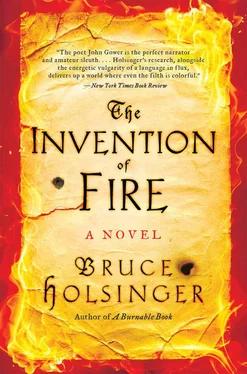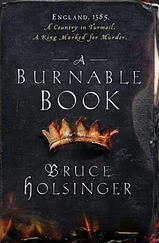Bruce Holsinger - The Invention of Fire
Здесь есть возможность читать онлайн «Bruce Holsinger - The Invention of Fire» — ознакомительный отрывок электронной книги совершенно бесплатно, а после прочтения отрывка купить полную версию. В некоторых случаях можно слушать аудио, скачать через торрент в формате fb2 и присутствует краткое содержание. Год выпуска: 2015, Издательство: HarperCollins, Жанр: Исторический детектив, на английском языке. Описание произведения, (предисловие) а так же отзывы посетителей доступны на портале библиотеки ЛибКат.
- Название:The Invention of Fire
- Автор:
- Издательство:HarperCollins
- Жанр:
- Год:2015
- ISBN:нет данных
- Рейтинг книги:3 / 5. Голосов: 1
-
Избранное:Добавить в избранное
- Отзывы:
-
Ваша оценка:
- 60
- 1
- 2
- 3
- 4
- 5
The Invention of Fire: краткое содержание, описание и аннотация
Предлагаем к чтению аннотацию, описание, краткое содержание или предисловие (зависит от того, что написал сам автор книги «The Invention of Fire»). Если вы не нашли необходимую информацию о книге — напишите в комментариях, мы постараемся отыскать её.
The Invention of Fire — читать онлайн ознакомительный отрывок
Ниже представлен текст книги, разбитый по страницам. Система сохранения места последней прочитанной страницы, позволяет с удобством читать онлайн бесплатно книгу «The Invention of Fire», без необходимости каждый раз заново искать на чём Вы остановились. Поставьте закладку, и сможете в любой момент перейти на страницу, на которой закончили чтение.
Интервал:
Закладка:
As I rounded the tower the smell hit me. Not the accustomed stench of the hermit’s filth, but a mingled air of burned wood and cloth. Beneath it was something darker, animal in its intensity. A lingering smell of cooked flesh.
The day’s light was fading, though enough remained to illuminate the chamber behind the barred window, where I knelt as if at prayer. Scorch marks were visible on the sides and top of the small opening and along portions of the inner walls, which were marred by several blackened patches. One of them was a blurred handprint. Yet the cell itself had been emptied and cleaned, Piers Goodman’s meager belongings removed. In their place, along the far wall and protected from the weather, now stood a dozen powder kegs, banded and marked with the livery of the king’s wardrobe at the Tower.
Back at the crossing I slipped the guard another coin. “Tell me all you know.”
He glanced over his shoulder, gave a slight shrug. “Not overmuch,” he said. “Got shuffled up here from the Newgate guard only this morning. The old fellow died, is what he did, and they hauled him to St. Bart’s or Spitalfields. Would have been two, three days ago. Burned his things in place rather than deal with the scent, then cleaned out the room and loaded it with powder.”
One of the city’s most durable hermits, tossed in a pauper’s grave. “Who burned him out?”
The guard’s eyes widened, then narrowed as he caught the implication of my question and the tone of my voice. He sucked in his lower lip and turned slightly to the side. His head bobbed in the direction of the next tower along the wall. “See that fellow up top?”
“Yes,” I said, pretending to discern the distant guard against the darkening sky.
“That’s Burgess there. He saw it all. Heard it, too. Ask him.”
Burgess, thankfully, was a guard I knew, a solid and trustworthy denizen of the London walls who’d sold me any number of useful scraps over the years. Soon after leaving the crossing I was climbing the next tower, the highest between Cripplegate and the postern below the Moorfields. As I came to his side he turned to greet me with a nod and a tightening of his lips. He waved away my coin. “You’re asking after our Piers?” he guessed.
“I am,” I said. “What did you see, Burgess?”
“A pack of Tower dogs done the thing,” he told me, his jaw rigid with his indignation. He gestured me to a crenel at the edge of the parapet. I gazed through the gap in the stone. Piers Goodman’s former home was situated below us and to the north, the scorched window clearly visible from where we stood.
“Seen it all from right here, this very spot,” he said. “They wedged the door from the outside, then shoved a clutch a torches and an armful of faggots through the bars. Poor old fellow never had a chance, did he?”
“And they were Tower men?” I asked him. “You are quite sure of it?”
“Sure’s a man can be,” he said. “One of those badged gangs. Wardrobe men, a dozen strong.”
It was one of the emerging divisions within the military ranks, increasingly sharp as England prepared for war with France. Though the soldiers manning the nearly two miles of city walls could be a proud bunch, the London guard was generally considered a lesser station than the Tower garrison. Even within the Tower itself there were fiercely guarded distinctions among the regular infantry squadrons and several more elite units of highly trained men charged with special missions and duties for the king, and regarded with an accordant mix of fear and awe. At the top of this latter group were the guards of the Tower wardrobe, a handpicked company of elite fighters whose particular duty entailed the full and final defense of the great stores of wealth and instruments of royal power held in the treasury and the armory at the Tower: gold, jewels, the royal mint, the privy seal, gunpowder. It was one of these companies, I suspected, that had descended upon Piers Goodman’s filthy lair to torch him from life.
At an odd sound from the soldier I looked back at him. His voice hitched as he tried to speak. Tears spilled down his young cheeks. I waited for his words.
“Piers, you know, he-he never screamed,” said the man. “Nor never cried out when they came for him and cooked him, even when the flames and smokes were pushing out that window there. Piers, he just chanted that bit of foulness he’d always be sparrowing through his bars.”
The soldier smiled sadly at the recollection, then, to my surprise, started to sing, a weak warble from his tongue at first, a faraway look in his hardened eyes as he chanted words I had heard a dozen times from Piers Goodman’s raving lips. “ I loved and lost and lost again, my beard hath grown so grey -”
From somewhere below us another voice took up the tune. “ When God above doth ease my pain my cock shall rise to play. ”
A second guard at the lower parapet, adding a strong burden to the hermit’s tune. The two of them continued with the next verse.
Merry it is while summer lasts,
Though autumn bloweth cold;
When God above doth calm these blasts
Shall hermits pricketh bold.
By the end of the verse two more guards had joined in, and as if by silent assent the four of them, then a fifth, then a sixth and a seventh began the hermit’s song anew, and soon the rough and growing choir of city guards and gatekeepers had become so many links in a sonorous chain stretching into the distance, as far as a man could hear.
It was as if the entire northern wall of London were come alive to breathe the hermit’s song, to throw its stony echoes off dozens of churches and inns, to bowl its tuneful hopes down the narrowest alleys and along the widest streets of ward and parish, to fill the great city beneath the early stars at dusk, and to soften a hard, impregnable wall with this rough requiem for its most durable inhabitant.
I loved and lost and lost again,
My beard hath grown so grey;
When God above doth ease my pain
My cock shall rise to play.
Merry it is while summer lasts,
Though autumn bloweth cold;
When God above doth calm these blasts
Shall hermits pricketh bold.
As the bawdy song of Piers Goodman filled the gathering dark I found my own lips shaping the hermit’s peculiar words, my tired lungs filling and emptying with his melancholy chant, like a creaky bellows gladdened with unfamiliar air. Dozens of soldiers were visible from our high parapet, their solemn faces down above Cripplegate and beyond lit with torches and lanterns against the coming of the night, as together we sang the death of the kindest, maddest, most selfless man we had ever known. A man who gave his life to God and to our city, burned to death in recompense.
Yet there was more than a shared fondness or melancholy intoned among the singers that night along the walls. Beneath the voices of these men, London soldiers all, was intermingled a note of defiance, a faintly mutinous undertone of discontent at the Tower’s wanton destruction of a harmless, joyous man.
To kill a hermit is a serious thing indeed. To burn a hermit alive, though, to trap him like a caged animal and crackle the very fat and flesh from his bones-this was something else. This, we all of us proclaimed in Piers Goodman’s fading song, this was evil.
Chapter 14
Neither slept that night nor the following, and though they remained in their separate spaces, between them there grew a new, unspoken intimacy, born of desperation and fear. There was no question of leaving the inn and their company, of venturing out along the roads alone, not after hearing of the highwaymen who had injured the boy and killed his father. Nor could they simply let chance take its course. A decision had to be made.
Читать дальшеИнтервал:
Закладка:
Похожие книги на «The Invention of Fire»
Представляем Вашему вниманию похожие книги на «The Invention of Fire» списком для выбора. Мы отобрали схожую по названию и смыслу литературу в надежде предоставить читателям больше вариантов отыскать новые, интересные, ещё непрочитанные произведения.
Обсуждение, отзывы о книге «The Invention of Fire» и просто собственные мнения читателей. Оставьте ваши комментарии, напишите, что Вы думаете о произведении, его смысле или главных героях. Укажите что конкретно понравилось, а что нет, и почему Вы так считаете.












